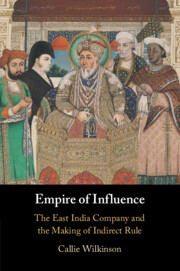Book contents
- Empire of Influence
- Empire of Influence
- Copyright page
- Dedication
- Contents
- Figures
- Maps
- Acknowledgements
- Note on Translation and Transliteration
- Chronology
- Abbreviations
- Additional material
- Introduction
- 1 A Time of Trouble
- 2 Negotiating the Disinformation Order
- 3 Warfare and ‘Wanton Provocations’
- 4 The Price of Pageantry
- 5 Weak Ties in a Tangled Web
- 6 Kinship, Gender, and Dynastic Dramas
- Conclusion
- Glossary
- Bibliography
- Index
5 - Weak Ties in a Tangled Web
Published online by Cambridge University Press: 23 March 2023
- Empire of Influence
- Empire of Influence
- Copyright page
- Dedication
- Contents
- Figures
- Maps
- Acknowledgements
- Note on Translation and Transliteration
- Chronology
- Abbreviations
- Additional material
- Introduction
- 1 A Time of Trouble
- 2 Negotiating the Disinformation Order
- 3 Warfare and ‘Wanton Provocations’
- 4 The Price of Pageantry
- 5 Weak Ties in a Tangled Web
- 6 Kinship, Gender, and Dynastic Dramas
- Conclusion
- Glossary
- Bibliography
- Index
Summary
Although historians have long recognized the important role that Indians played in the English East India Companys operations, the focus has usually been on the mechanics of direct rule in British India. Yet, the expertise of Indian cultural intermediaries was arguably even more important, as well as more contested, in the context of the Companys growing political influence over nominally independent Indian kingdoms. Focusing on the relationship between Residents and their Indian head secretaries (or munshis), this chapter considers how these relationships were conceptualized and debated by British officials, and reflects on the practical consequences of these relationships for the munshis involved. The tensions surrounding the role of the munshi in Residency business exemplify some of the practical dilemmas posed by the developing system of indirect rule in India, where the Resident had to decide how much responsibility to delegate to Indian experts better versed in courtly norms and practices, while at the same time maintaining his own image of authority and control. Although the Resident–munshi relationship was in many respects mutually beneficial, these relationships nevertheless spawned anxieties about transparency and accountability within the Company itself, as well as exciting resentments at court. Both Residents and munshis were required to negotiate between two political and institutional cultures, but it was the munshi who seems to have borne the brunt of the risks associated with this intermediary position.
- Type
- Chapter
- Information
- Empire of InfluenceThe East India Company and the Making of Indirect Rule, pp. 177 - 208Publisher: Cambridge University PressPrint publication year: 2023

